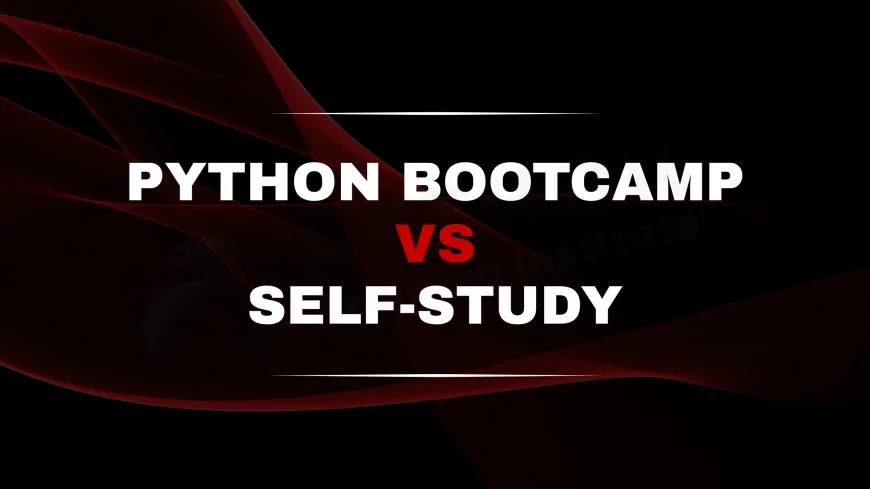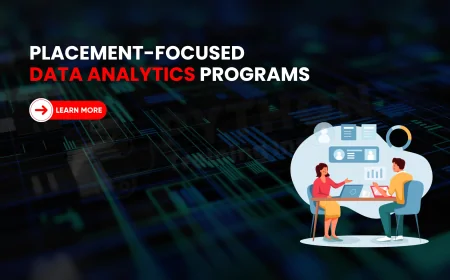Python Bootcamp vs Self-Study | Which Is Best for Your Career in 2025?
Not sure whether to join a Python bootcamp or go the self-study route? Discover the pros, cons, and career impact of each learning path. Learn why Python bootcamps in Pune are a game-changer for aspiring developers in 2025. Make the right choice for your future in tech.

Python has become one of the most popular programming languages, powering everything from web applications to data analysis and artificial intelligence. As the demand for Python developers grows, many aspiring programmers face a crucial decision: Should they enroll in a coding bootcamp or pursue self-study?
This comprehensive guide aims to help you make an informed choice by examining the key differences, advantages, and challenges associated with both learning paths.
Understanding the Learning Paths
Coding Bootcamps
Coding bootcamps are intensive, short-term programs designed to teach programming skills in a structured environment. They typically last between 8 to 16 weeks and focus on practical, job-ready skills. Bootcamps often include:
-
Structured Curriculum: A predefined syllabus covering essential topics.
-
Mentorship: Access to instructors and teaching assistants for guidance.
-
Peer Collaboration: Opportunities to work with fellow students on projects.
-
Career Services: Support with resume building, interview preparation, and job placement.
Self-Study
Self-study involves independently learning programming through various resources such as online tutorials, books, and practice projects. This approach offers:
-
Flexibility: Learn at your own pace and schedule.
-
Cost-Effectiveness: Access to numerous free or low-cost resources.
-
Customization: Tailor your learning path based on personal interests and goals.
Comparing Key Factors
1. Structure and Curriculum
-
Bootcamp: Provides a well-organized curriculum that guides students through a logical progression of topics. This structure helps prevent gaps in knowledge and ensures coverage of essential concepts.
-
Self-Study: Requires learners to curate their own curriculum, which can be challenging without prior experience. The lack of structure may lead to an uneven understanding of topics.
2. Pace and Time Commitment
-
Bootcamp: Demands a significant time commitment over a short period, often requiring full-time dedication. This accelerated pace can lead to rapid skill acquisition but may be overwhelming for some.
-
Self-Study: Allows learners to set their own pace, making it suitable for those balancing other responsibilities. However, the extended timeline may lead to slower progress.
3. Cost
-
Bootcamp: Typically involves a substantial financial investment, covering tuition and possibly additional expenses. Some programs offer financing options or income share agreements.
-
Self-Study: Generally more affordable, with many free resources available. However, learners may choose to invest in paid courses or materials for more structured guidance.
4. Support and Community
-
Bootcamp: Offers immediate access to instructors and peers, fostering a collaborative learning environment. This support can be crucial for overcoming challenges and staying motivated.
-
Self-Study: Lacks built-in support, requiring learners to seek out communities or forums independently. This approach demands greater self-motivation and initiative.
5. Career Services
-
Bootcamp: Often includes career support services, such as job placement assistance, resume reviews, and interview coaching. These services can enhance employability upon completion.
-
Self-Study: Does not inherently provide career services, placing the responsibility on the learner to navigate the job market and prepare for employment opportunities.
Pros and Cons Summary
| Aspect | Bootcamp | Self-Study |
|---|---|---|
| Structure | Structured curriculum | Self-directed learning |
| Pace | Accelerated, full-time commitment | Flexible, learner-determined pace |
| Cost | Higher financial investment | Generally low-cost or free |
| Support | Access to instructors and peers | Requires self-motivation and external networking |
| Career Services | Includes job placement assistance | Self-managed job search |
Choosing the Right Path for You
Consider a Bootcamp If:
-
You prefer a structured learning environment with clear guidance.
-
You can commit full-time to an intensive program.
-
You value immediate access to support and mentorship.
-
You're seeking expedited entry into the job market with career services.
Opt for Self-Study If:
-
You require flexibility to balance learning with other commitments.
-
You're self-motivated and comfortable navigating resources independently.
-
You're exploring programming as a hobby or side interest.
-
Budget constraints make bootcamp tuition prohibitive.
FAQ's
1. What are the main differences between a Python bootcamp and self-study?
A Python bootcamp at a reputed training institute in Pune offers structured guidance, hands-on projects, and expert mentorship, unlike self-study, which demands discipline and lacks immediate support. Bootcamps accelerate learning and career growth, while self-study is ideal for flexible learners. Choosing bootcamp ensures industry-relevant skills and placement-focused training.
2. Is a Python bootcamp better than self-learning for beginners?
Yes, especially for beginners. Python bootcamps in Pune offer real-time support, beginner-friendly modules, and career mentoring. Unlike self-learning, bootcamps help clarify concepts faster and build confidence through guided projects. Institutes also prepare students for job roles with placement assistance and resume-building workshops.
3. Can I land a job faster with a Python bootcamp in Pune?
Absolutely. Python bootcamps in Pune focus on industry-ready skills, portfolio development, and mock interviews to boost job readiness. Their structured approach and placement support services give learners a competitive edge, unlike self-study paths that often lack clear direction or job-oriented preparation.
4. How long does it take to learn Python through a bootcamp vs self-study?
A bootcamp typically lasts 3–6 months with intensive, focused training, while self-study can take longer due to lack of structure. Python Training Institutes in Pune help you master core and advanced Python topics faster, offering accelerated learning tracks and project-based modules aligned with job market demands.
5. Are bootcamps in Pune worth the investment for learning Python?
Yes. Bootcamps in Pune offer value with expert mentors, real-world projects, certification, and placement assistance. While self-study is low-cost, it lacks accountability and support. Bootcamps bridge the skill gap quickly, preparing learners for high-demand roles like Python Developer, Data Analyst, and Automation Tester.
6. Do bootcamps provide hands-on Python project experience?
Definitely. Python bootcamps in Pune prioritize hands-on learning with real-time projects in data science, automation, and web development. These projects build a strong portfolio, crucial for job applications. Self-study lacks structured project feedback, making bootcamps a better choice for applied learning.
7. Which learning mode is better for working professionals—bootcamp or self-study?
For time-constrained professionals, Python bootcamps in Pune offer part-time or weekend batches with guided mentoring, ensuring focused learning without burnout. Self-study demands high discipline and may slow progress. Bootcamps streamline learning with structured timelines and career transition support.
8. How do bootcamps in Pune help with career placement?
Python Training Institutes in Pune offer 100% placement assistance, including resume building, interview coaching, and job referrals. This structured career support is rarely available in self-study. Bootcamps connect students with hiring partners and offer live job portal access, speeding up job placements.
9. Are Python bootcamps in Pune suitable for non-technical students?
Yes. Reputed institutes in Pune design Python bootcamps for all backgrounds, starting with basics and progressing to advanced concepts. With expert mentorship, interactive labs, and doubt-solving sessions, even non-tech learners can thrive—something hard to achieve via self-study alone.
10. What’s the average cost of a Python bootcamp in Pune vs self-study?
Python bootcamps in Pune typically range from ₹20,000–₹50,000, offering mentorship, certifications, and placement support. Self-study may be cheaper or even free, but lacks structured guidance. Bootcamps are an investment in career growth, offering tangible outcomes like job offers and project portfolios.
11. Can I build a strong portfolio through a Python bootcamp?
Yes. Bootcamps focus on project-based learning, where students build real-world applications in automation, data analysis, and web development. Institutes in Pune offer mentorship to refine projects for portfolios, which is vital for job applications—something self-study methods often overlook.
12. Do Python bootcamps offer certifications?
Yes. Most Python Training Institutes in Pune provide industry-recognized certifications upon course completion. These certifications validate your skills and enhance your resume. Self-learners may miss out on such formal recognition unless they pursue separate exams, often without training support.
13. How flexible are Python bootcamps compared to self-study?
Bootcamps now offer flexible learning options—weekend, evening, and online classes—especially in Pune. This flexibility rivals self-study while still providing structure and mentorship. Learners benefit from accountability and guided learning, unlike self-paced study, which risks inconsistency.
14. Is mentorship available in Python bootcamps in Pune?
Absolutely. Institutes in Pune offer direct access to experienced mentors for doubt resolution, career advice, and code reviews. This guided learning path is invaluable for faster growth, unlike self-study, where learners often struggle to find credible answers or feedback.
15. Do bootcamps teach job-ready Python skills?
Yes. Python bootcamps in Pune are designed around current industry needs—data structures, OOP, APIs, automation, and frameworks like Django. The job-ready curriculum ensures you're prepared for roles like Backend Developer or Data Analyst. Self-study lacks such targeted, outcome-driven planning.
16. Can self-study ever match the quality of a bootcamp?
It depends on the learner’s discipline and access to resources. However, Python bootcamps in Pune offer structured paths, expert feedback, and real-world experience that self-study often cannot match. For most learners, bootcamps provide a faster, more assured route to a tech career.
17. Are bootcamps good for preparing for Python certification exams?
Yes. Python Training Institutes in Pune align bootcamp syllabi with popular certifications like PCEP, PCAP, and CEPP. Bootcamps include mock tests, guided practice, and exam strategies, offering better preparation than unguided self-study methods.
18. What kind of job roles can I get after a Python bootcamp?
Graduates of Python bootcamps in Pune are eligible for roles such as Python Developer, Data Analyst, Automation Engineer, Backend Developer, and QA Tester. The bootcamp’s placement assistance and job-readiness training help you confidently apply and succeed in these roles.
19. Can I switch careers with a Python bootcamp in Pune?
Yes. Python bootcamps in Pune are ideal for career switchers. With intensive training, career mentorship, and hands-on projects, these programs help you transition into tech roles without prior experience. Career changers benefit from structured guidance and placement services not available in self-study.
20. How do I choose the best Python bootcamp in Pune?
Look for institutes offering structured curriculum, certified trainers, real-world projects, and placement support. A good Python Training Institute in Pune will have strong student reviews, career mentoring, and flexible schedules. These elements are critical for ensuring success in your tech journey.
Final Thoughts
Both bootcamps and self-study offer viable paths to learning Python, each with distinct advantages and challenges. Your decision should align with your personal learning style, schedule, financial situation, and career objectives.
By carefully evaluating these factors, you can choose the approach that best suits your needs and sets you on a successful path to mastering Python programming.
What's Your Reaction?
 Like
0
Like
0
 Dislike
0
Dislike
0
 Love
0
Love
0
 Funny
0
Funny
0
 Angry
0
Angry
0
 Sad
0
Sad
0
 Wow
0
Wow
0














